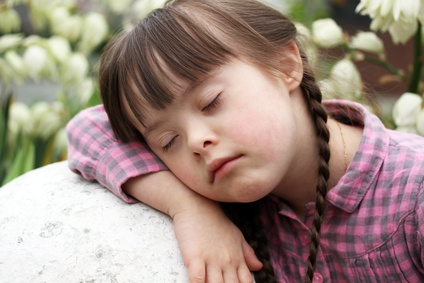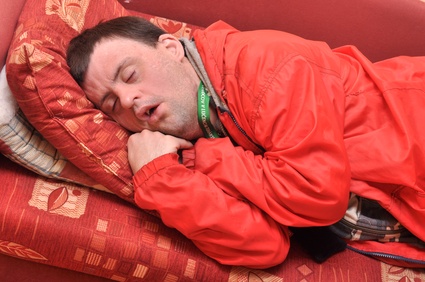Today’s (long overdue) post is on behalf of all those with and caring for people with Down’s Syndrome. Whilst I am no medic myself, I am in the honoured position of having links with 2 experts who have a wealth of knowledge regarding the worrying lack of awareness of just how high the risk people with Down’s Syndrome have with an undiagnosed sleep disorder – mainly Sleep Apnoea. In this blog post I aim to bring information together from both Lizzie Hill, BSc Hons, RPSGT, and PhD Research Fellow currently in the Department of Sleep Medicine at the University of Edinburgh, and Dr Rosenberg, D.O., FCCP, whose practice is now limited to the specialty of Sleep has a good article about this ‘People with Down’s Syndrome have a high risk for sleep apnoea.’
As with a lot of people who have various medical conditions, so often their symptoms are simply put down to their existing condition, when in actual fact often it’s unrelated or interrelated, and this happens a lot in people with Down’s Syndrome. I have personally spoken with several carers of people with Down’s Syndrome, and so often once they are treated for Sleep Apnoea, they go on to a much better overall quality of life.
The main symptoms of undiagnosed and untreated Sleep Apnoea:-
- Daytime tiredness – often with the need for naps when circumstances permit.
- Snoring
- Sudden awakenings from sleep (but not always as many sufferers are unaware of waking up).
- Lack of concentration, poor work or school performance and possibly memory problems or confusion.
- Depression, anxiety or irritability.
- Morning headaches.
- Dry mouth and/or sore throat on waking.
- Decreased sex drive.
- They may already be a diabetic, have heart problems, have had a stroke/TIA or have hypothyroidism.
- The may already be on medication for high blood pressure.
- Many other symptoms can be present due to sleep deprivation.
There is more information over on the website regarding causes and treatment etc. http://www.hope2sleep.co.uk/page/sleep-apnoea-info
Dr Rosenberg says
“……….Unfortunately, what is frequently underappreciated is the very high incidence of sleep apnoea in Down syndrome. It is estimated that 50% of children and 80% of adults with Down syndrome have sleep apnea. This is due to several predisposing factors. People with Down syndrome often have large tongues and floppy muscle tone. There tends to be a narrowing of the midface and they are likely to be overweight. They also are apt to have larger tonsils and adenoids. When this is all taken together, it results in a very high risk of having sleep apnea.
Early diagnosis and treatment of sleep apnea is important in these individuals. The repetitive collapse of their airways is accompanied by severe drops in oxygen. This causes damage to areas of the brain needed for reasoning, intellect, and emotional control.
The high pressures generated in the pulmonary arteries because of sleep apnea can further worsen the frequently found congenital heart defects in those with Down syndrome. Over time, if not treated, a significant amount of blood may flow directly from the right side of the heart to the left, bypassing the lungs and delivering insufficient oxygen to the body. Untreated this can lead to a progressive decline in exercise capacity and eventually death.
What do we look for in children with Down syndrome? Things to be aware of include loud snoring, restless sleep, and sleeping in odd positions such as sitting up and leaning forward. Also, trouble getting out of bed and excessive napping during the day. A shortened attention span and becoming easily irritated or frustrated are other signs of disrupted sleep. If any of these are noticed, it is important to have the child checked out.
What should be done? The American Academy of Pediatrics feels so strongly about the consequences of sleep apnea that they recommended in a 2011 position paper that pediatricians routinely educate parents about the symptoms of Down syndrome and if present, refer them to a sleep specialist……..”
Another good article can be found at https://www.everydayhealth.com/down-syndrome/
There is some excellent information on the Down’s Syndrome Education’s website (DSE) here http://www.down-syndrome.org/reviews/320/ for overcoming sleep problems with helpful advice on sleep hygiene etc.
Back to this side of the pond, Lizzie Hill is so passionate both on a personal and working level, and is currently leading a Sleep and Down’s Syndrome Study at the Edinburgh University, and they desperately need as many volunteers over the age of 16 with Down’s Syndrome as possible – both those with and without sleep problems, anywhere in the UK, but especially Scotland/north of England. Every volunteer will be offered a Sleep Study followed by trial treatment if a problem is diagnosed.
For the sake of all people with Down Syndrome, I would ask you to share this blog please to raise awareness and get these people the help they truly deserve for a better quality of life!
Best Wishes for Good Sleep!
Kath



